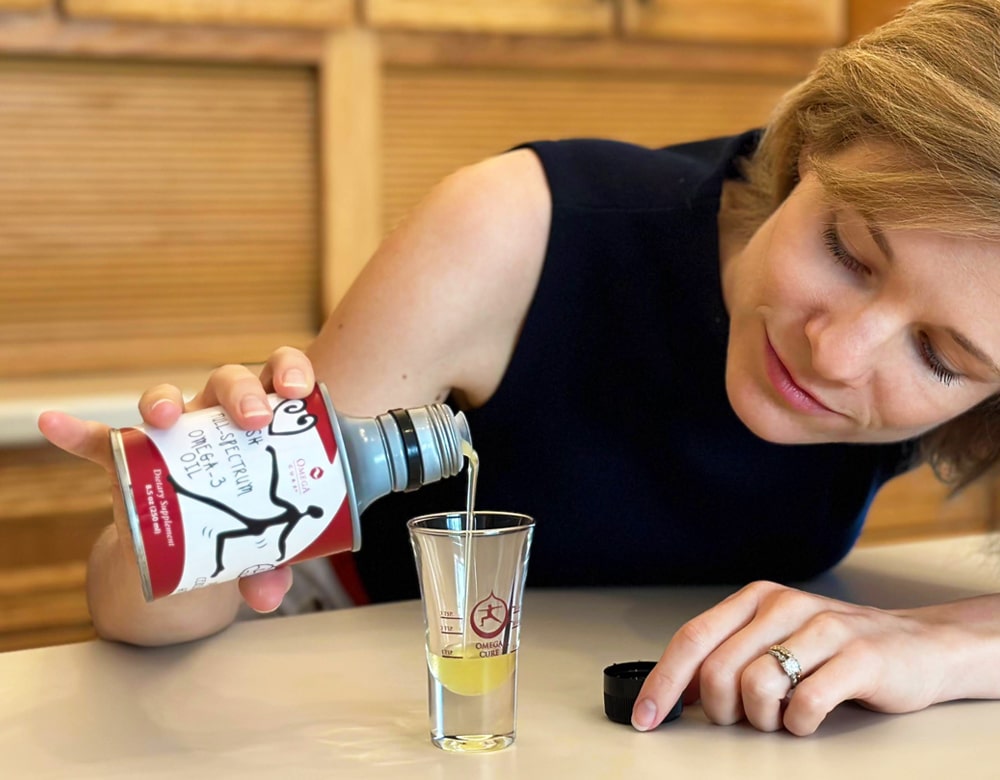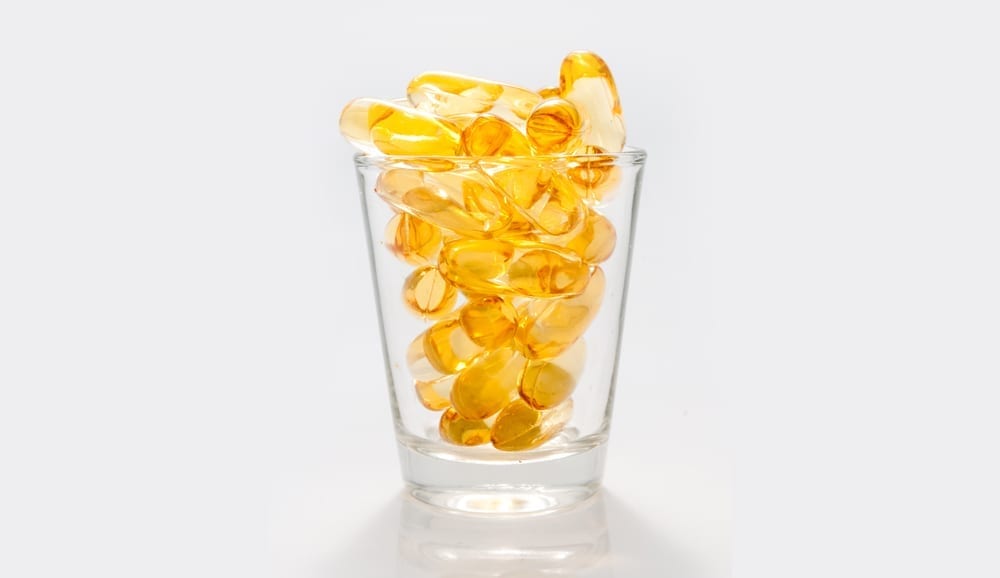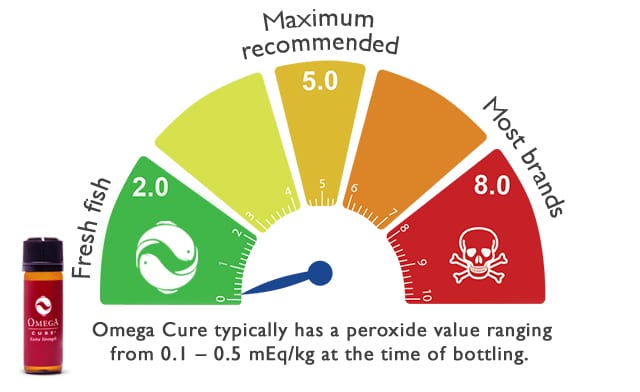Is Rancid Fish Oil Safe to Consume?
Think about fish oil. If your gut reaction is “yuck,” you are in good company.
Whether it’s from remembering Grandma’s cod liver oil or taking those horse-pills in the cupboard, most people believe that fish oil ought to taste bad. We put up with the unpleasant fish oil smell and taste because, well, it’s hard to argue with the benefits substantiated in thousands of research studies.
But the truth is that high quality omega-3 products shouldn’t taste like yesteryear’s salmon. If your current fish oil capsules smell fishy – or give you nauseating burps throughout day – you most likely have a rancid product on your hands.
Why Does Fish Oil Go Bad So Quickly?
As seafood lovers know, fish spoils more easily than other foods if not kept cold or consumed quickly. The same goes for fish oil.
The reason fish and fish oil spoil quickly is that they are rich sources of polyunsaturated omega-3 fatty acids. Known for their anti-inflammatory benefits, omega-3s are characterized by their large numbers of reactive double bonds. While this chemical structure makes the omega-3s extremely flexible and responsive in the cell, the same trait also explains why these fatty acids are so vulnerable to the effects of oxygen.
As fish oil oxidizes, new byproducts begin to form in the oil called lipid peroxides, as well as harmful aldehydes and ketones. These oxidation byproducts are what gives off the unpleasant smell and taste of spoiled fish.
The rate at which the omega-3 molecules oxidize depends on a number of factors, including how the fish were harvested and the oil processed. But once an oil has started to oxidize, there is no going back. At that point, it’s simply a matter of time before the oil goes rancid and counteracts the benefits of omega-3 fish oil.
Any foods or supplements rich in omega-3s are vulnerable to spoiling quickly.
Rancid Fish Oil Effects Are Cause for Concern
Aside from tasting and smelling bad, rancid fish oil is less effective than fresh fish oil. Because oxidized omega-3 molecules have a different chemical shape and reactivity than their unoxidized fatty acid counterparts, they’re not able to carry out the same functions in the cell.
Can Rancid Fish Oil Make You Sick?
Many scientists also believe that consuming rancid fish oil may be harmful. At least two comparative studies to date show that consuming rancid fish oil can increase bad cholesterol levels. And in animal studies, oxidized fatty acids have been found to cause organ damage, inflammation, and atherosclerosis, among other problems.
This is why it’s critical to consider the freshness level of your omega-3 supplement, whether it’s made from fish oil, krill oil or algae.
Unfortunately, independent studies from Canada, New Zealand, Norway, South Africa, and more have discovered that the majority of over-the-counter omega-3 supplements exceed acceptable oxidation limits, long before the products’ supposed expiration dates.
How to Combat Rancidity in 5 Easy Steps
While rancid fish oil is unfortunately all too common, fresh fish oil can provide consumers with a relatively inexpensive, safe way to improve health. Some of the most commonly cited benefits of getting enough omega-3s includes: lowering triglyceride levels and blood pressure, improving joint discomfort and mobility, and improving focus and mental health.
To ensure optimal benefits, seek out a high quality fish oil product by doing the following:
Step 1: Evaluate Your Current Product
When assessing fish oil, put all products through the taste and smell test. Truly fresh fish oil has no fishy taste or smell, just like fresh fish.
To tell if your fish oil capsules are rancid, break them open. If your nose catches a pungent smell, it’s time to throw your capsules away.
Liquid omega-3 supplements also go bad with time and exposure to oxygen. So if your liquid fish oil or cod liver oil smells and tastes bad, get something else.
Rancidity is something you can taste and smell. In this video, a tasting panel compares Omega Cure® with a krill oil, prenatal omega-3 supplement, and fish oil capsule. See how they do and try it yourself at home!
Step 2: Make Smart Purchases
Fish oil is a food substance that’s highly perishable, just like milk or seafood. To a certain degree, it can be stabilized, but beware of labels that have two- or three-year expiration dates.
You wouldn’t eat two-year-old salmon stored at room temperature, would you? If your product has been sitting on the shelf for years, it’s almost certainly rancid.
Step 3: Check Your Fish Oil’s Oxidation Values
How oxidized an omega-3 product is can be measured by looking at its oxidation values, better known as the peroxide, anisidine, and TOTOX levels.
The peroxide value indicates the amount of lipid peroxides that have formed in the oil, while the anisidine values measures the levels of secondary oxidation byproducts, like aldehydes. The TOTOX value, which is calculated based on the peroxide and anisidine values, provides a more complete picture of the freshness level of the oil.
Typically, the lower the peroxide, anisidine, and TOTOX numbers are, the fresher the oil. You can learn more about how to interpret these numbers here.
Though these measurements aren’t perfect – especially if an oil contains flavoring – it’s an excellent, clinical way to determine rancidity. If your fish oil brand doesn’t showcase their oxidation values, be sure to request them!
Remember: Oxidation levels only provide a snapshot of the oil’s freshness level the moment they are measured. A fish oil supplement’s oxidation values can be many times higher by the time it reaches the consumer, often months or even years later. That’s why it’s important to keep assessing freshness by using the taste and smell test!
Peroxide and anisidine values are two key freshness measurements.
Step 4: Keep It Cold
Low temperatures slow down the enzymatic time bomb that is ticking away. That’s why freezing or refrigerating fish oil helps keep it fresh for longer.
Step 5: Use It or Lose It
When buying fish oil, look for small containers, not supersized bottles. The longer a fish oil is stored, the greater the chance it will oxidize over time.
Similarly, use up your omega-3 product in a timely manner. Often, people think they’re saving money by keeping old capsules or bottles of oil. But you wouldn’t keep old fish in your refrigerator. Think of fish oil supplements in the same way and throw old products out.
Omega Cure: The Freshest Fish Oil
At Omega3 Innovations, quality, freshness, and transparency lay the foundation of all our products. We’re dedicated to manufacturing the best liquid fish oil with a fraction of the oxidation levels of any other omega-3 supplements on the market today.
To learn more about how our oil is made, visit Omega3 Innovations’ About Our Oil page.
Try Exceptionally Fresh Omega Cure
Experience the Omega3 Innovations difference for yourself with the most effective fish oil supplement on the market.
Buy Now
Recent Posts
-
Dose, Joint Health, Omega-3
Omega-3 & Pain Relief: Finding the Best Strategy
Are you one among the 1 in 5 Americans grappling with chronic pain, as reported by the CDC [1]? If the thought of traditional pain medications and their potential side...3 months ago -
Eye Health, Omega-3
The Startling Link Between Skin Care and Eye Health
Dry eye complaints are on the rise worldwide. Many risk factors – including aging and increased computer use – help explain the increase. But there's another driver few people know...5 months ago -
Heart Health
Does Taking Fish Oil Lower Cholesterol?
Many people believe that incorporating omega-3s into their diet will solve their cholesterol woes. But the truth is much more nuanced; it's not as simple as taking a daily fish...1 year ago -
Immune Health, Sleep
Melatonin & COVID-19: Can This ‘Sleep Hormone’ Help?
It started with a runny nose and a slight cough. But when his 72-year-old wife tested positive for COVID-19, he got concerned. “Is there any research suggesting the supplements we...2 years ago -
Full-Spectrum Fish Oil, Omega-3
Is It Good to Store Fish Oil in the Freezer?
Fish oil is a great source of the omega-3 fatty acids we all need for good health. It’s also highly perishable. Consuming rancid fish oil can have negative health implications....2 years ago -
Omega-3
Our Favorite Omega-3 Fish Oil Benefits
Omega-3 fish oil certainly has a reputation for delivering a plethora of incredible benefits. And it’s true! Omega-3 fatty acids have been studied for a broad range of health conditions....2 years ago











Comments (13)
I am looking for fish oil that doesn’t smell bad. Do you have a sample of your oil that I could try first before purchase it? Also I would love all the information you have. Thank you so much
Hi Lisa Stevens!
Wonderful to hear from you! Unless you are a Sarasota resident, we unfortunately don’t have any samples to send you at the moment. However, in September, we will launch our newest product, Omega Cure Extra Strength. Omega Cure Extra Strength delivers our ultra-fresh fish oil in single-serving glass vials. We are planning to package those glass vials in a one-week trial kit, which would give you an opportunity to sample the oil at a significantly reduced rate.
Also, if you go ahead and give us a call at the office (941-485-4400), then one of our customer service representatives will be more than happy to take your address and put together material for you. I can also direct you to some of our online information, if you can tell me more about what you are looking to know.
Finally, if you are interested in joining our mailing list, we do put together monthly newsletters with a lot of great information, as well as send out regular product offerings. That might be an interesting way for you to get better acquainted with our products!
Hope this helps! We look forward to hearing from you.
here in India, we have good reviews of Nature’s bounty fish oil. Do you think they are up to standards in maintaining the quality of oil (logevity) until ,the expiry date.
While we can’t speak for the quality standards at another company, we can give you some pointers on how to evaluate the quality of the oil for yourself. Here’s what we suggest in determining whether or not the product is fresh.
1) Cut open your fish oil product and taste/smell the oil inside. If it tastes and smell very bad, throw it out. It is rancid.
2) If you’re still unsure, you can contact the company and ask them to report their PEROXIDE/TOTOX values. Of course, the values they report may be skewed because they would have been taken before the oil went into the capsule and not after the (most likely) many months it took for the capsule to get to you. But knowing the PEROXIDE/TOTOX values would give you an indication as to how much the company values the quality of the oil from the outset.
We doubt that the great majority of fish oil capsules can be fresh. This is because, during the encapsulation process, the oxygen in the air binds to the gelatin. Over a period of a couple of months, the oil slowly turns rancid. Because many capsule products sit on the shelf for many months or even years before the consumer buys it, the oil inside the capsule is typically highly oxidized by the time most people get around to taking it. For more information on rancidity and capsules, you might be interested in reading “The Rancid Truth about Omega-3 Fish Oil,” which delves more deeply into the topic. Let us know if you have more questions!
Hi, I am a resident in the uk and have been looking for a good quality fish oil for years. Most of them that are actually available in the uk are no good and in no way even comparable to your quality. However, you do not currently deliver to the uk, nor can I find your product elsewhere. When can you expect to deliver to the uk? Many Thanks!
Hi Richard,
We are happy you took the time to write to us. We’re expecting to be able to deliver to the UK by the fall of 2016 with our Omega Cure Extra Strength vials. If you stay posted on our website and social media pages, we will be spreading the word as soon as it is available.
Hi, I purchased Omega 3 Fish oil from Amazon about 2 months ago …
And I kept it cool and dry area , and I took only 30 or 40 caps but last days , It’s a acidic smell inside the bottle , I guess It’s bad … What can I do ? , I like the products but this odour nausea my stomach :((
If you think your omega-3 product is rancid, it probably is and you should get a fresh oil instead. You can’t restore a rancid oil back to freshness; you can only conceal the bad taste and smell.
Consider asking yourself: Would you eat old fish for dinner or drink rancid milk? If the answer is no, the same logic applies to fish oil.
Besides tasting and smelling bad, rancid omega-3 oils can have adverse health effects. We’re actually in the process of publishing a new blog series that delves further into this topic, especially looking at some of the newer research. You might want to check out this blog, Why Is Getting a Fresh Fish Oil So Important, which addresses some of the negative health consequences of consuming rancid oil.
On the plus side, fresh omega-3 products do exist. Omega Cure, for instance, has no fishy taste or smell and has an oxidation level far below that of other omega-3 brands.